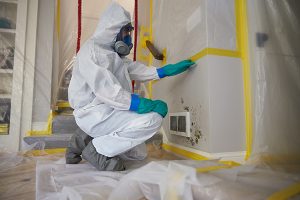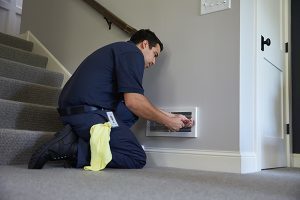Water damage can lead to a number of problems if not treated right away, the biggest one being mold, which can be a serious threat to your health and your property. As mold colonies cling to porous materials, including wood and drywall, the mold slowly consumes the property structure, causing discoloration, deterioration, and rotting.
The Importance of Professional Mold Removal
Mold removal should never be considered a DIY project; it’s a job that requires proper certification, products, and methods in order to be fully removed. While it’s best to hire a mold remediation contractor, not all professionals are created equal.
A lot can go wrong in the mold removal process, such as having the mold spread throughout the property and settling onto new surfaces. A qualified contractor would set up a containment chamber to prevent the mold from spreading.
An uninsured contractor can also make matters worse if they allow cross contamination, causing further damage while failing to remove the initial case of mold.
Here are some questions to ask when looking for a mold remediation professional.
1. Do you recommend testing the environment?
To determine the success or failure of a remediation project, testing should be done both before and after the service. But it should not be done by a remediation professional as it’s a conflict of interest. They should also never dismiss it as unnecessary; it’s preferable to have an outside source conduct the testing.
2. Do you consider mold to be a health hazard?
Mold remediation professionals don’t work in the healthcare industry, but they must understand the dangers that mold poses. They must be aware of the mycotoxins within mold and understand the difference between a mold allergy and the response to a toxic substance.
3. Do you contain the area properly?
It’s crucial to contain the area before starting the remediation process. If the contractor dismisses the idea, then they should be dismissed. Containing the mold will include setting up plastic sheeting as well as protection at the entrance to the contained area to prevent cross contamination. All negative air machines (NAMs) should also be HEPA-filtered and exhausted outside.
4. Is your work documented?
All work performed by contractors should be documented with digital pictures. This is extremely important when removing building materials. The pictures should be provided to the customer after the work is completed.
5. Are you insured?
While some contractors operate without insurance to keep costs down, it can cost you more in the end. Having someone who is fully insured in all of their business practices is crucial.
6. How do you dispose of waste?
All building materials and contents affected by mold should be thrown away right after the removal process; they must never be stored on the property for any reason. To minimize any potential break or leakage, the disposal route must also remain as short as possible. All items must be double-bagged to prevent cross contamination.
7. Is your equipment wrapped?
Any mold removal process should involve the use of air scrubbers and HEPA vacuums. But the equipment should also be wrapped before entering the job site to prevent cross contamination from previous jobs.
8. Are your employees certified and trained?
All mold removal professionals must pass extensive training and receive IICRC certification before they are sent out to a job site. All trusted mold removal contractors will have certified employees.
9. Do your technicians wear personal protective equipment?
Just as important as it is to be insured, all mold removal professionals should wear safety glasses, shoe covers, and hazmat suits to prevent spreading mold to other areas of the home or building.
10. Do you guarantee your work?
There is always a chance that mold will return after the service, solely because some mold growth was missed. But proper testing in the home after the project will catch any of the remaining spores, allowing the professionals to fully complete the job so you don’t have to worry about the mold returning in the future. A reputable mold removal company will guarantee their work while taking care of any issues following the first remediation project.
11. Do you provide free estimates?
Most mold removal companies will provide free estimates, however, they should never be given over the phone. The professional must first inspect the area to determine the extent of the damage and the scope of the project. As this also requires work, if the property owner decides to move forward with the service, the estimate charge is taken off the bill at the end of the service.
Work with a Professional Mold Removal Contractor
While mold can grow in any area with excess moisture, including the bathroom, shower, bedrooms, attic, crawlspace, etc., it’s important to address it right away to prevent it from spreading further. When calling a mold removal contractor, it’s important to ensure they are licensed, insured, trained, and experienced before beginning the work, otherwise you may have a bigger problem on your hands.
Our professional mold removal contractors at ServiceMaster of Aurora will arrive on-site with professional products and equipment, ready to inspect the area and determine the extent of damage. After determining the scope of the project, we will set up a containment chamber to prevent the mold from spreading, remove the source of the mold, and use professional HEPA vacuums and air scrubbers to remove the remaining spores.
Mold testing will also take place before and after the project to ensure the mold is effectively removed. If any remains, we will focus on the areas missed, conduct another testing, and work until the test comes back negative. After the mold removal process, we will work with your insurance company during the claims process so you can focus on other matters.
This way you can have the peace of mind knowing the mold is fully removed and your property is restored. You also won’t have to worry about any threats to your personal health.


